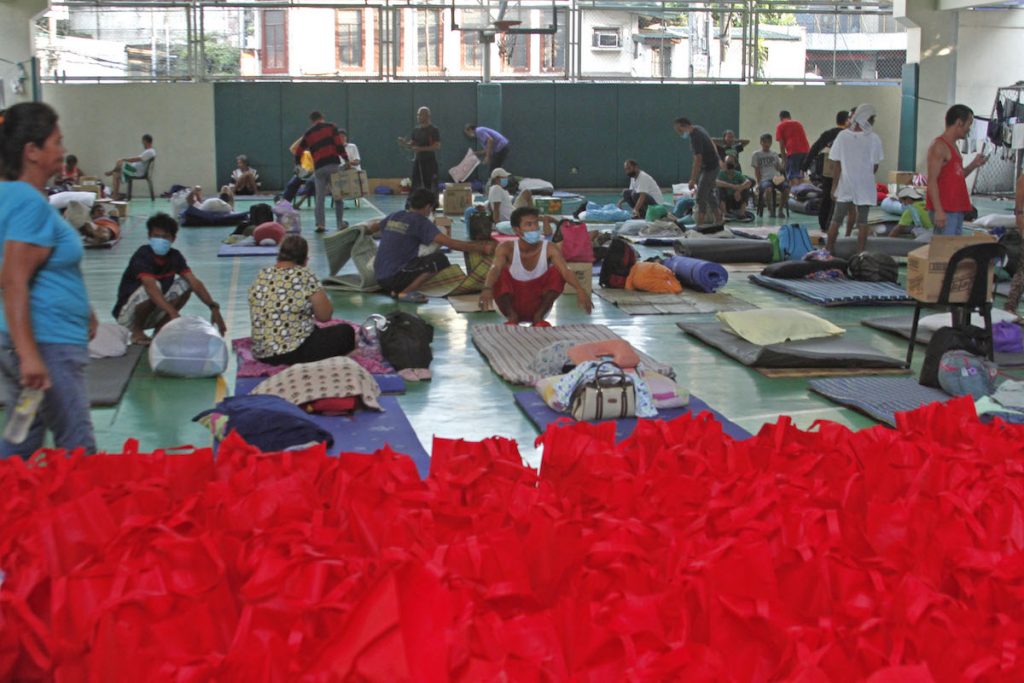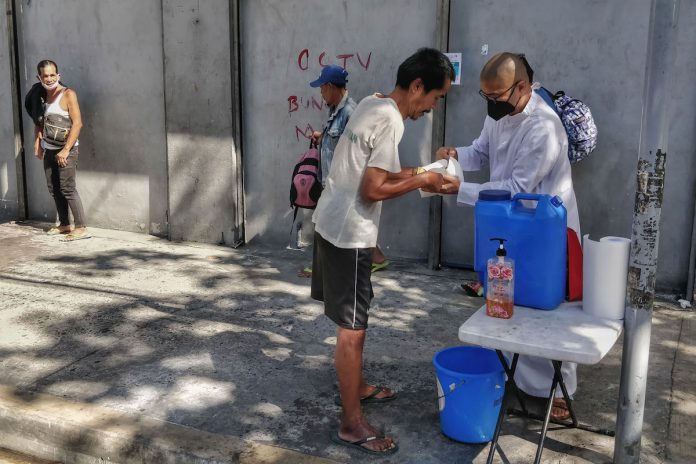On a dusty lane flanked by sharp leaves of sugarcane, a group of men start their long march.
Each one carries a sack of rice or other provisions like canned goods, powdered drinks, and vitamin supplements. Some are hunched almost double from the weight on their shoulders.
The men wear faded shirts and denim, or cheap, cotton long shorts sold in the public markets around the San Carlos Diocese in Negros Occidental, a province in the central Philippines.
They cross a stream in feet shod in worn-down rubber slippers and then navigate a slippery trail of rocks. They clamber up 45-degree slopes of clay and limestone and cross waters once more. A hanging bridge sags from their weight.
These are sugar worker volunteers for the diocese led by Bishop Gerardo Alminaza, a staunch advocate for the rights of the poor in the province he serves.
Circles of kindness
The men aren’t just on a mercy mission to feed upland farming families affected by the novel coronavirus lockdown that has stranded millions of Filipinos for almost a month now.
They are also on the lookout for crop harvests that could go to rot due to a travel ban.
Father Reymond “Bebs” Cañete, head of the Virgin of Antipolo mission station, scours villages for farmers and fisherfolk with no means to bring their crops and catch to markets.
Their normal means of transport, motorcycle with wings on each side, has been banned for the duration of the quarantine.
The priest sells the products to members of his lowland community who lack passes to leave their homes. The goods sell out quickly, with many residents in town centers expressing willingness to buy more from the local “Caritas Kindness Store.”
Caritas is the Catholic Church’s social service arm. Its international head is Cardinal Luis Antonio Tagle, now in Rome as the new head of the Congregation for the Evangelization of Peoples.
The supplies brought to the farmers come from the kindness centers in parishes, an idea that sprang from a community in Bicol, on the southernmost tip of Luzon, and adopted by the Catholic Bishops’ Conference of the Philippines’ national secretariat for social action.

Dog-eat-dog
The program seeks to assure farmers, who are among the poorest Filipinos, “that there is a community ready to care and support them.”
But it isn’t a one-way street.
Without farmers, residents of urban centers will have to scramble for food. Prices of basic products have been rising due to demand and a tightened supply of goods.
The diocesan program also intends to show the symbiotic relationship between sectors and classes in a polarized society.
Churches and civic groups in the countryside see the lockdown as an opportunity to show, by example, lessons in the inter-relatedness of people and other aspects of creation.
To live and work together is the Church’s call; to pour all energies into helping others while holding the government accountable to policies and actions that further fray the social fabric in the time of COVID-19.
But in the urban centers, the normal silence of Holy Week in the Philippines has erupted into a series of harsh tit-for-tat in social media over the question of aid.
As President Rodrigo Duterte’s government struggles to keep pace with the needs of at least 18 million poor Filipinos, lockdown hardships have worsened class tensions in Asia’s largest Catholic-majority society.
Over the last few days, legitimate calls for financial aid to the middle class have morphed into attacks against the poor.
‘Poor by choice’
The furor was deliberately sparked by a social media army deployed to divert attention from problems in the government’s response to COVID-19.
Cynical spin masters succeeded exploiting legitimate gripes into contempt for the poor.
They are poor by choice, said one message shared verbatim by thousands. They don’t deserve help because they live beyond their means; they get drunk, they smoke, they make too many babies. They have no right to bite the hand that feeds them.
A matriarch of an eight-member family suffered jeers, simply by claiming they need US$158 weekly for food and living needs. That’s the most the poor will receive for a month under a government emergency aid program.
Any cursory check of academe and government websites would validate the woman’s claim and even show this as an understatement. But educated, comfortable individuals, who can spend that much in one night of revelry or a day’s shopping spree, mocked the woman for what they considered aspirational delusions.
Law of the jungle
These same folks were donating food to the homeless and protective gear to health front-liners last week. Some even adopted urban poor families for the duration of the crisis.
Surreal as it seems, such behavior is expected during social crises, said Father Wilfredo Dulay of the Missionary Disciples of Jesus and a convenor of the Religious Discernment Group.
“During calamities and pandemics, the best and the worst in the human species often compete for dominance,” he said.
“The ancient law of the jungle, otherwise called the instinct for survival, stealthily asserts itself,” wrote the priest in his prepared Easter message.
“Right now, in the context of the escalating COVID-19 pandemic, the beauty and the beast in us are in a fierce tangle,” he added.
“And no pundit dares yet to predict who’d be emerging victorious in this current version of the eternal struggle between good and evil, between light and darkness, between life and death.”
But there is hope and the priest said the margins are succeeding in breaching the social gap.
In the area of social justice, society’s betters have plenty to learn from the unnamed, often unheard voices on the peripheries.
Inday Espina-Varona is an award-winning journalist in the Philippines. She is a recipient of the “Prize for Independence” of the Reporters Without Borders in 2018. The views expressed in this article are the opinions of the author and do not necessarily reflect the editorial stance of LiCAS.news.









